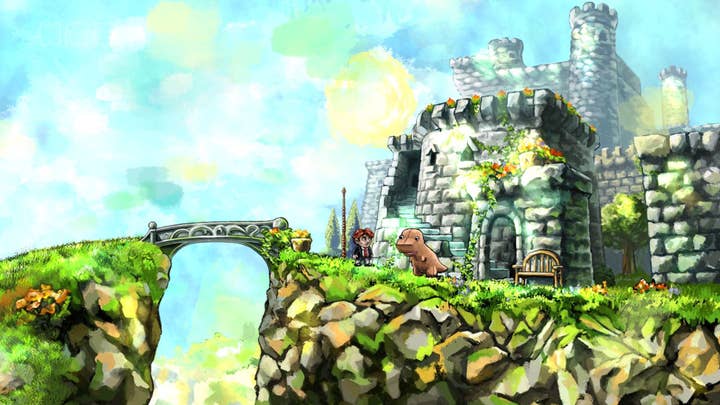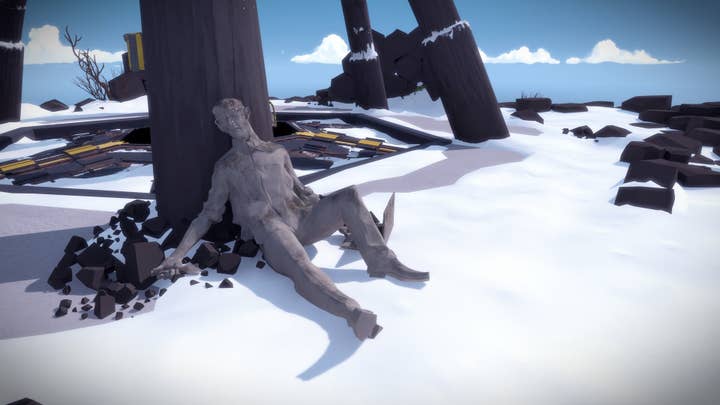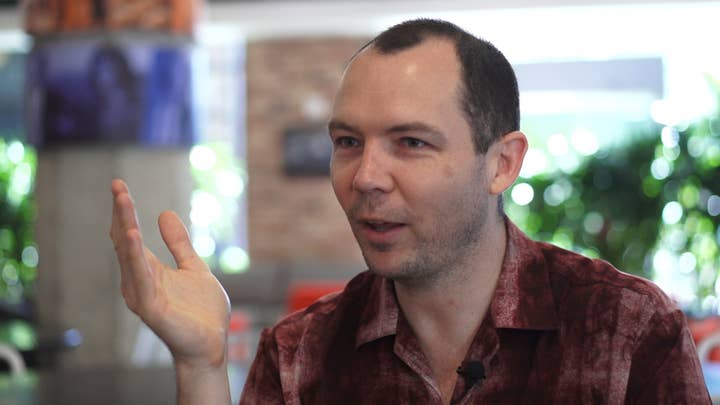Jon Blow: "The job isn't to be in a community; the job is to make a good game"
The creator of The Witness on the rise of indie devs across Asia, and being part of the indie community versus "doing the hard work that it actually takes"
Earlier this month, Thekla founder Jonathan Blow dropped by the Singapore Games Guild's Industry Day to give a keynote speech on indie game development. The revered, experimental designer had just come from a conference in Taipei, Taiwan, where he'd spoken at length about the challenges he faced during the early days of working on Braid. We talked to him about cultural differences in the indie dev scene and the role of community in indie game culture today.
After his talk, we sat down with Blow to discuss the cultural differences between the indie development scenes in Asia and the west, and the role that community can and should play in indie game culture today.
It's one of the main trends that's obvious, and it's easy to recognise because the USA was like that at one time. People making independent games in Japan have 'grown up' as developers in this context where there's a long history of Japanese games. Japan was the world leader in making certain types of video games for a long time. You just recognize when a game is Japanese. Developers there have a very recognisable tradition that they're playing off of, and they can follow along or reject it, but it's the context that they're working in.
"There's been Chinese participation in games for a long time, but not a lot of development... There's this process of figuring out what is a Chinese video game, exactly?"
Whereas someone in mainland China, they don't exactly have that. There's been Chinese participation in games for a long time, but not a lot of development. The console gaming industry there is mostly pirated stuff, so there's this process of figuring out what is a Chinese video game, exactly? It's just not as developed. That makes it hard for people there, because if you fall back on things that are known, it suddenly feels like an American or Japanese game. But that also means you have a great amount of expressive power as a creative individual, because you can help determine what a Chinese game means.
You mean the addictive mechanics?
Yes. I don't think microtransactions are inherently unethical, but there are many scales. There's little tricks that [companies] like to do to make you do things, and that's where it starts becoming unethical. For me, the basis of it is, what is the relationship between the designer and the player? I try to talk to game developers about this, and even the ones who are doing really slimy stuff, they want to think of themselves as good people.
I haven't spoken to many people in Asia about this, but when I talk to people in the west they act like it's complicated and hard to think about, and I don't think it is. I think it's very simple: how do you treat the person that you're making the game for?

That's actually not bad advice. If somebody wants to go into video games, on the technical side, I'd say go get a computer science degree. I say that, but I dropped out of Berkeley. But I know what you're saying. In the US, your parents want you to be a doctor or a lawyer, because those are the perceived high-status, high-paying professions. I imagine it's much stronger here, generally across Asia. Family ties just aren't taken as seriously in the US.
"When I was working on Braid, most people I talked to thought the game was bad, and they didn't want anything to do with it"
With independent games, the upside is that when you make a game and ship it, the amount that you make from that is not really capped. It's just, how successful is the game? If you put a really lousy game out, nobody's going to be interested. Even before Braid came out, that was also true. When I was working on Braid, most people I talked to thought the game was bad, and they didn't want anything to do with it. It was hard to get people to work on the game. If people think something is amateurish, they won't even pay attention to it. But if you get past that barrier, then suddenly you can have very big success.
I think Singapore has an advantage over much of the rest of Asia when it comes to making games that people around the world will want to purchase. For example, English [language] is very good here, and that makes a difference in the way things are presented. If a Chinese game gets exported and translated into English, you can still feel that it's a foreign game, whereas a game from Singapore I don't feel like would have that friction attached. I think all these different regions in Asia have a great deal of potential.
It feels like things are a little bit on a knife edge, where if it tips a little bit, people will start having success with independent games, see the success, and keep going. Just seeing something happen makes people believe that they can do it too. I think a lot of the time, that's all that has to happen. Now, Beijing has been like a weird special case, because there's been the weird government crackdown on games in the past year, so who knows what's going to happen there. But places like Taipei, it definitely feels like that.
I certainly don't see why not. I just got done talking to a bunch of people out there who legitimately wanted to explore game design and do experimental things. The last question was, to paraphrase: "It just seems so hard to do things that haven't been done." It might seem that way to a younger person, but I was talking about how you learn about games by example -- by playing games -- so at first you only really know what you've seen. It's a skill that you can build to incrementally diverge away from those designs and get to somewhere different.
"There's just a way that online people want to get mad. They want to take something the wrong way, and then they do"
It was that kind of a conversation, and there were several of those in a row. That was really nice. That's the right kind of thinking for people to have. Any one of those people I just talked to could make a new game that's interesting and appeals to a lot of people as well.
Oh yeah. It's very hard for me to take that kind of thing seriously. I've been around long enough that that kind of thing has happened several times. I don't feel like I'm generally saying anything particularly offensive, or particularly out there. I'm definitely saying things that other people may not say, but there's just a way that online people want to get mad. They want to take something the wrong way, and then they do.
One of the many things that I don't like about journalism is where people's impression of the event changes just by someone changing the headline. So I think the headline that was picked for that was something about me saying that indie developers are stagnant. That was like a throwaway line in the middle of this long thing. Maybe it was a hot button thing to say, but maybe that's a symptom of the problems we have with social media today. It's not my problem.

I was trying to bring this point up in response to this specific western indie game community that I saw developing. There was this whole wave in 2008, 2009, when a number of indie games were successful. After that, I would go to GDC every year, and indie game development was getting to be a bigger and bigger thing.
For certain people, it became much more about the image and concept of being an indie game developer, rather than doing the hard work that it actually takes. Because games are hard, and making them good is even harder than just making them. And what I was seeing was all these people just wanting to feel good about being in the game development community. This is also tied into a degree to which culture -- younger generations in America -- is much more about feelings, generally, and about feeling good, and about personal identity.
"If you're aspiring, it matters very much whose advice you take, because it's going to determine if you survive or not"
No, no, they're not. But the job isn't to be in a community; the job is to make a good game. If you can make a good game, and be in the community, and feel good, that's great. But what I was seeing was people who thought that feeling good and being in the community was the point, in this relatively vacuous western definition of community. There's nothing wrong with being in a group, there's nothing wrong with feeling good in a group, unless you say, "that's enough, I'm not going to do the work."
Definitely. But I also think this is something that self-corrects, because frankly, the people doing it wrong don't survive. And what I'm trying to do is help people survive. So when I say stuff like that, most of the people who got mad are not people who successfully have created indie games. I worry about that. If you're aspiring, it matters very much whose advice you take, because it's going to determine if you survive or not -- if you survive very lean and desperately, or whether it goes better. I'm just trying to give people the best advice, that's all.
Yeah, I understand that. But a lot of people might say that about indie games in the west, and it seems to make sense. But at the same time, I didn't ever have that, and I did fine.
Well, it's weird. When I dropped out of school, it was like 1994, 1995. And I was vaguely aware that a thing you could do was go and start a startup company. That was in Berkeley, in the Bay Area. Whereas today, there's like Y Combinator and all these other people. I think that's super helpful. I didn't have that back then.
We started a game company, and we were terrible at many aspects of it -- like the business part -- and the company eventually went out of business. I can definitely see today that it's much more positive that there's this support structure now, and it's definitely a business support structure. It's not exactly like a friend community thing, but it provides that to some extent. The environment is different.
Nobody from my generation had much of a support structure, and there are lots of people from my generation who did great. It makes logical sense to say supporting people more will help, and maybe it does, but I'm just not sure how to think about it.

